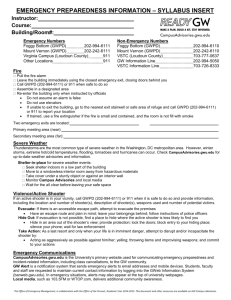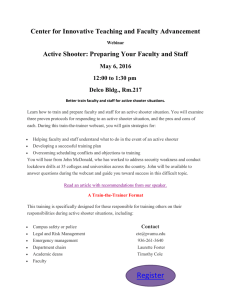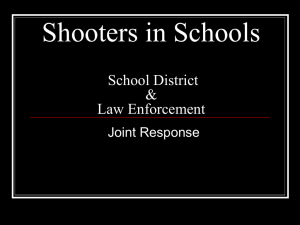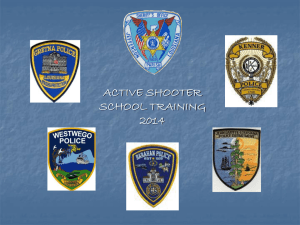ACTIVE SHOOTER RESPONSE 1. Emergency Management Plan
advertisement
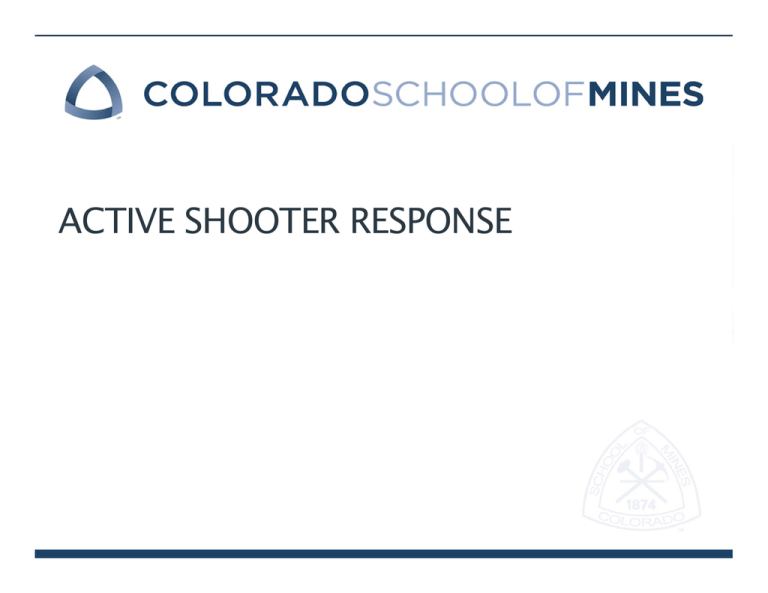
ACTIVE SHOOTER RESPONSE 1. Emergency Management Plan The world has changed! ‣ Student Life and Public Safety are fully aware of this as a campus ‣ Personal safety is everyone’s responsibility – Keep Yourself Safe – Be your own safety advocate – Important for you to be responsible, knowledgeable, and comfortable on campus ‣ Public Safety has a trained and experienced staff – We continue to work on ways to inform, train, and keep our campus safe – Work with other local agencies ‣ Campus Emergency Notification – – – – Will receive information in an emergency Sign up your cell phone when semester starts – Inside.mines.edu Updating our system Update information and Future training Overview ‣ An emergency partnership. response requires a campus-wide ‣ Active shooter situations are often short in duration, unpredictable, and evolve quickly. ‣ Individuals must be prepared both mentally and physically to deal with an active shooter situation. ‣ A campus emergency is not and cannot be the sole responsibility of first responders. ‣ First responders will respond to the crisis by stopping the shooting and mitigating harm to victims. ‣ First responders are unlikely to be in a position to coordinate a lockdown or evacuation. What is an Active Shooter? ‣ Suspect(s) activity is immediately causing death and serious bodily injury. The activity is not contained and there is immediate risk of death or serious injury to potential victims. – Not a hostage situation – Not a stand off – Not a barricaded perpetrator – But can transition to one of these Why is this Necessary? ‣ Within the last five years, there have been at least 17 prominent, high- casualty producing active shooter incidents. ‣ Most of these cases have occurred in locations where the shooter has been undeterred and unobstructed from carrying out their attack. The incident locations have often been described as soft targets (something easy to attack). ‣ The list of school shootings continues to grow, however, and school administrators, law enforcement personnel, parents, and concerned citizens must consider all possibilities. ‣ An effective response requires specific planning. ‣ To promote the development of options for action during those first few minutes. ‣ Unless a situation begins with the shooter confronting a police officer, the first reaction will come from individuals whose professional orientation is far removed from armed conflict. The goal is to promote the development of better awareness and options for those whose reactions will define the incident until the police arrive, Purpose To enable emergency responders and staff to perform essential emergency planning and response functions that will: ‣ Save lives ‣ Establish responsibilities necessary to performing these functions ‣ Prevent, minimize and repair damage ‣ Ensure continuity of operations so that essential services may institution. continue to be provided to the Action Steps Adopt a survival mindset during a crisis In the event you suspect, encounter, or witness an active shooter, adhere to the following response actions, including: ‣ EVACUATE (RUN) ‣ HIDE ‣ TAKE ACTION (FIGHT) In an active shooter situation, all involved persons must quickly determine the most reasonable way to protect their own lives Evacuate If there is an accessible escape path, attempt to evacuate the premises. Be sure to: ‣ Have an escape route and plan in mind ‣ Evacuate regardless of whether others agree to ‣ ‣ ‣ ‣ ‣ ‣ ‣ follow Leave your belongings behind Help others escape, if possible Prevent individuals from entering an area where the active shooter may be Keep your hands visible Follow the instructions of any police officers Do not attempt to move wounded people Call 911 when you are safe Hide Out If evacuation is not possible, find a place to hide where the active shooter is less likely to find you. Your hiding place should: ‣Be out of the active shooter’s view ‣Provide protection if shots are fired in your direction (i.e., an office with a closed and locked door) ‣Not trap you or restrict your option for movement To prevent an active shooter from entering your hiding place: ‣Lock the door ‣Blockade the door with heavy furniture ‣Close, cover and move away from any windows Hide Out If the active shooter is nearby: ‣Lock the door ‣Silence your cell phone (even vibration settings can give away a hiding position) ‣Turn off any source of noise (i.e., radios, televisions) ‣Hide behind large items (i.e., cabinets, desks) ‣Remain quiet If evacuation and hiding out are not possible: ‣Remain calm ‣Dial 911, if possible, to alert police to the active shooter’s location ‣If you cannot speak, leave the line open and allow the dispatcher to listen Take Action As a last resort, and only when your life is in imminent danger, attempt to disrupt and/or incapacitate the active shooter by: by: ‣ Acting as aggressively as possible against him/her ‣ Throwing items and improvising weapons ‣ Yelling ‣ Committing to your actions Cover vs. Concealment Consider the difference between cover and concealment. concealment. ‣ Cover might protect a person from gunfire, while concealment will merely hide a person from the view of the shooter. ‣ Persons in an active shooter situation should quickly choose the best space that is available. ‣ Finding cover is preferable, but if cover is not available you should find a position of concealment. • DO NOT PULL FIRE • ALARMS CALL 911 WHEN IT IS SAFE TO DO SO! Information to Provide to Law Enforcement or 911 operator ‣ Location of the active shooter ‣ Number of shooters, if more than one ‣ Physical description of shooter/s ‣ Number and type of weapons held by the shooter/s ‣ Number of potential victims at the location When Law Enforcement Arrives ‣ Officers will proceed directly to the area in which the last shots were heard. ‣ The first officers to arrive will not stop to help injured persons because their first priority is to eliminate the threat and secure the scene. ‣ Remember officers on scene will likely be wearing various types of uniforms, including street clothes, and may be armed with weapons. Law Enforcement Priorities Law enforcement’s purpose is to stop the active shooter as soon as possible. Law Enforcement Active Shooter Training • Stop the killing as soon as possible • Save the lives of those in proximity of the shooters • Save the lives of Police Officers • Contain the situation When Law Enforcement Arrives ‣ Additional Officers may arrive, including SWAT teams These teams may: – Wear regular patrol uniforms or external bulletproof vests, Kevlar helmets, and other tactical equipment. Some officers may be in plain clothes – Be armed with rifles, shotguns, or handguns – Use pepper spray or tear gas to control the situation – Shout commands, and push individuals to the ground for their safety ‣ Emergency Medical Personnel – Rescue teams will treat and remove any injured persons – May request able-bodied individuals to assist in removing the wounded from the premises How to React When Law Enforcement Arrives ‣ Remain calm, and follow officer’s instructions ‣ Put down any items in your hands (i.e., bags, jackets) ‣ Immediately raise hands and spread fingers, keeping hands visible at all times ‣ Avoid making quick movements ‣ Avoid pointing, screaming, and/or yelling ‣ Do not stop to ask officers for help or directions when evacuating, just proceed in the direction from which officers are entering the premises Post-Incident ‣ After reaching a safe location or assembly point, all persons involved in the situation likely will be held in that area by law enforcement until the situation is under control, and all witnesses have been identified and questioned. ‣ No one should leave the safe location or assembly point until law enforcement authorities indicate it is safe and their questioning has been completed. Summary Good practices for coping with an active shooter situation Run Hide • Be aware of your environment and any possible dangers • Take note of the two nearest exits in any facility you visit • If you are in an office, stay there and secure the door • If you are in a hallway, get into a room and secure the door Take Action (Fight) • As a last resort, attempt to take the active shooter down. When the shooter is at close range and you cannot flee, your chance of survival is much greater if try to incapacitate him/her CALL 911 WHEN IT IS SAFE TO DO SO! Reference: Active Shooter- How to Respond, U.S. Department of Homeland Security Mines Emergency Alert http://inside.mines.edu/Mines_Emergency_Alert http://inside.mines.edu/Mines_Emergency_Alert ‣ Notification is used for: Actual emergencies declared by the Colorado School of Mines emergency personnel and administration and weatherrelated closure or delay. ‣ Subscribe Today Logon to Trailhead and go to "Self Service." Click on "Personal Information" and then "Mines Emergency Alert System.“
